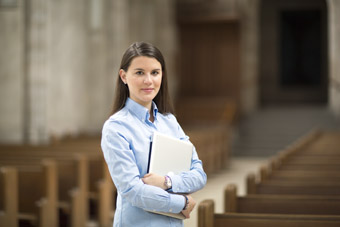I was raised in a somewhat religious family. My parents jumped around from church to church, trying to find one that fit; never staying at one for more than a couple of years. Every Sunday morning, my parents struggled to convince me to go.
I’m not sure if this was because of my adolescent rebellious streak or my genuine dislike of church, or both. Either way, I grew up dismissing religion in general and, at times, even resenting it. Yet, I remained curious about those for whom religion is deeply important. I never thought that I would become a journalist who covers this topic.
In 2008, I began my undergraduate degree at Trinity College. I took a course on religion and human rights that included material on the Dhammayietra – annual peace walks led by Cambodian Buddhist monks that began in 1992 as a means to restore order to a nation devastated by the Khmer Rouge. Learning about the Dhammayietra challenged my preconceived notions about religion and brought to light the complex forces behind religious belief and its powerful potential for cultivating peace in times of despair.
After the course ended, I replaced my English major with one in religion and reconsidered my lifelong dream of going to law school. All I knew was that I wanted a career with some tie to religion, still unsure as to what exactly that would look like.
In my final year, I interned at the Tony Blair Faith Foundation (a group that uses religion to combat extremism) assisting with Faiths Act, its international interfaith fellowship program. People from different faith and non-faith backgrounds worked in pairs on projects in their communities related to the United Nations’ Millennium Development Goals. While Mr. Blair has received much criticism, especially lately for his involvement in Middle East affairs and the News of the World phone hacking scandal, I’m still convinced that his aim to foster religion as a force for good is valuable.
Inspired by the foundation’s work for human rights, I began my master’s degree in human rights at the London School of Economics in 2012, writing my dissertation on Christian efforts to combat human trafficking in the U.S., where there is a huge amount of attention and money directed at the issue, and an even greater debate around whether this actually solves the problem. In my field research I heard compelling and sometimes heart-wrenching stories from human trafficking survivors and people working at anti-human-trafficking groups. I was able to recount some of these stories in my final paper, but was unsatisfied with having to confine them to the realm of academia. I realized that journalism might be an ideal way to combine my religion research with my desire to reach a wider audience.
Last May, I completed the Fellowship in Global Journalism at the Munk School of Global Affairs, where I reported for various media outlets, including the National Post and VICE, on the use of religion to combat, and sometimes contribute to, human trafficking. I wrote stories on the quirkier side of religion (an American Internet-based church that evangelizes at porn shows across the world) and its more inspiring side (a Catholic group that successfully turns thousands of refugees into Canadians). And as I currently investigate forced marriage in religious communities in Canada, I feel even more confident in my choice to write on religion for as wide an audience as possible. Modern religions are indeed an ever-evolving force to be reckoned with, especially as the line between religion and politics is increasingly blurring around the world, and journalists are an integral part of ensuring we get the whole story.
Rachel Browne (BA 2012 Trinity) is a reporter and editorial intern at Maclean’s magazine.
Recent Posts
For Greener Buildings, We Need to Rethink How We Construct Them
To meet its pledge to be carbon neutral by 2050, Canada needs to cut emissions from the construction industry. Architecture prof Kelly Doran has ideas
U of T’s 197th Birthday Quiz
Test your knowledge of all things U of T in honour of the university’s 197th anniversary on March 15!
Are Cold Plunges Good for You?
Research suggests they are, in three ways




